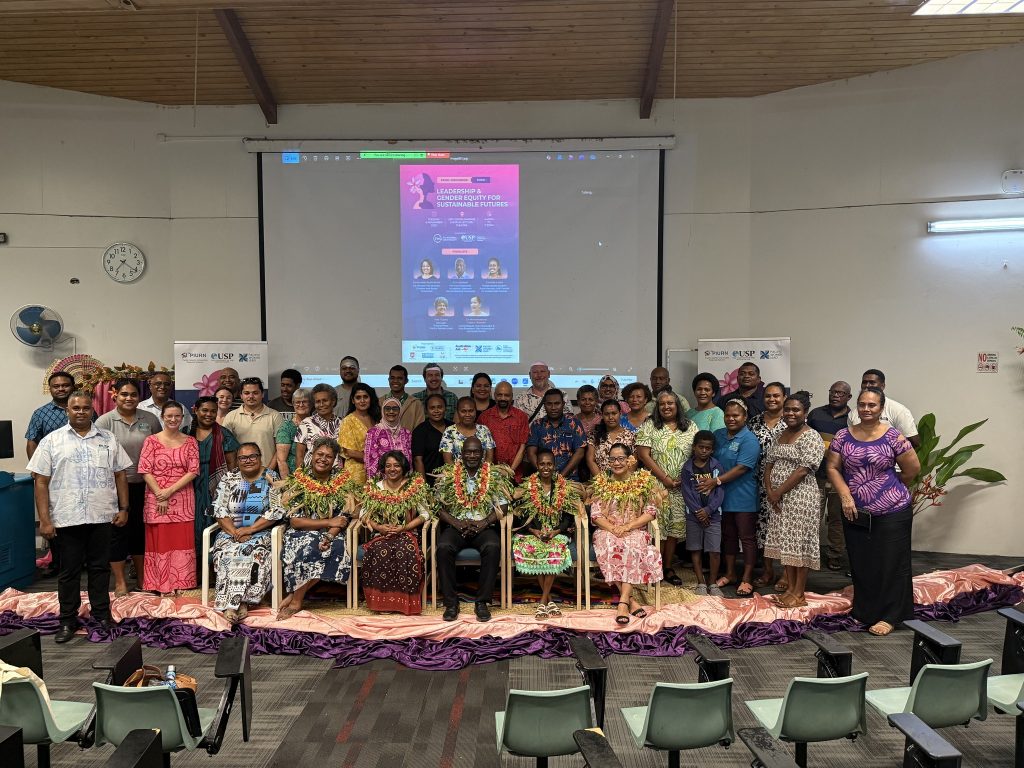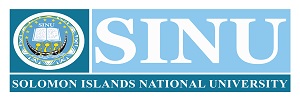
𝐏𝐫𝐞𝐬𝐬 𝐑𝐞𝐥𝐞𝐚𝐬𝐞
𝟏𝟏 𝐍𝐨𝐯𝐞𝐦𝐛𝐞𝐫 𝟐𝟎𝟐𝟓
The vital role of women in leadership across the Pacific — from communities and academia to government and politics — was the central theme of the “Leadership & Gender Equity for Sustainable Futures” panel discussion held on Tuesday, 4 November 2025, at The University of the South Pacific’s Lower Laucala Campus in Suva, Fiji.
The event brought together regional leaders from government, academia, youth networks, and the private sector to share experiences and perspectives on advancing women’s participation in leadership, particularly within the fields of Science, Technology, Engineering, and Mathematics (STEM).
The panel discussion was co-hosted by The University of the South Pacific’s Centre for Sustainable Futures and Fiji National University (FNU) as part of a wider regional initiative under the research project titled “Barriers to Female Leadership for Staff at Selected Pacific Island Universities, with an emphasis on STEM.”
This collaborative project is jointly implemented by USP, Solomon Islands National University (SINU), The National University of Samoa (NUS), and the Pacific Islands Universities Regional Network (PIURN). It is funded under the Pacific Women Lead (PWL) Programme at the Pacific Community (SPC), with support from the Australian Government (DFAT).
The Chief Guest and keynote panellist, Hon. Sashi Kiran, Fiji’s Minister for Women, Children and Social Protection, commended the partnership among Pacific universities for advancing gender equality and strengthening women’s leadership in higher education.
Hon. Kiran acknowledged the Fiji Government’s early support in helping the project secure its funding through a letter of endorsement in June 2023.
“Enhancing women’s leadership is not just about equality — it is about effectiveness,” Hon. Kiran stated. “Sustainable development in Fiji and the Pacific depends on inclusive decision-making that draws on the perspectives, talents, and experiences of all people.”
She reaffirmed the Fijian Government’s commitment to supporting women’s leadership through national initiatives such as the Fiji Women’s Economic Empowerment National Action Plan (2025–2030) and Gender-Responsive Planning and Budgeting (GRPB) frameworks.
“Our Ministry’s evolving strategy — combining individual empowerment, institutional reform, and partnerships — reflects a clear truth: when women lead, systems strengthen, and societies endure,” Hon. Kiran said.
Representing the Solomon Islands National University, Associate Professor Eric Katovai, Pro Vice-Chancellor Academic (PVCA) and member of the project’s Advisory Board, was one of the featured panellists.
In his remarks, Dr. Katovai emphasized the need for men in leadership to play an active and deliberate role in supporting women’s advancement in universities and beyond.
“Fostering gender-equitable leadership begins with intentional policy and institutional culture,” Dr. Katovai said. “Universities must move beyond encouraging equality to embedding it within their governance systems — through recruitment, promotion, and representation policies that are measurable, monitored, and resourced.”
Drawing on experiences experience in academia, Dr. Katovai explained that transparent selection processes, mentoring, and professional development opportunities are key enablers of lasting institutional change.
“Gender equity is not a women’s issue — it’s a leadership issue. It defines the kind of institution we want to be and the kind of future we want to shape,” he added.
Dr. Katovai also shared insights on how universities can integrate gender and sustainability into leadership development for students.
“If we want our future leaders to value gender equity and sustainability, we must weave those principles into every layer of university life — from curriculum design to student life and governance,” he noted.
He highlighted that SINU is currently undertaking a comprehensive curriculum review, to be completed by 2027, which aims to introduce programs connecting environmental responsibility with gender awareness.
“Sustainability is not just about the environment — it’s about the wellbeing and inclusion of people within the environment,” Dr. Katovai said.
In concluding his contribution, Dr. Katovai called for institutions and governments across the Pacific to make women’s leadership central to sustainability agendas.
“We must make women’s leadership a core part of sustainability, not a side issue,” he urged. “Stewardship in the Pacific is incomplete without the leadership of women, who have always been central to community resilience and inter-generational knowledge.”
He emphasized that sustainable futures for the Pacific depend on both men and women leading together — with shared vision, mutual respect, and deep care for people and the planet.
“That is the leadership model our universities must champion — one that reflects who we are as Pacific people and what we aspire to become,” he concluded.
About the Project
The “Barriers to Female Leadership for Staff at Selected Pacific Island Universities, with an emphasis on STEM” project aims to identify systemic challenges and opportunities to strengthen women’s leadership across higher education institutions in the Pacific. It is implemented collaboratively by USP, FNU, NUS, SINU, and PIURN, with funding support from the Pacific Women Lead Program at the Pacific Community (SPC), through the Australian Government (DFAT).
ENDS//
